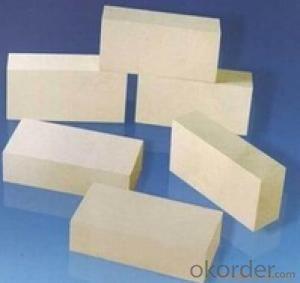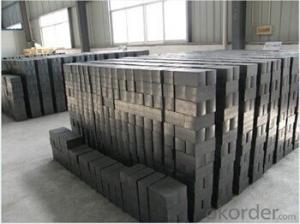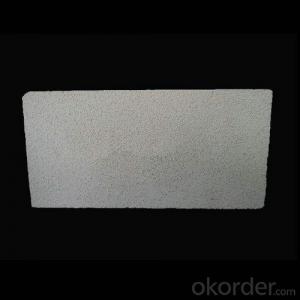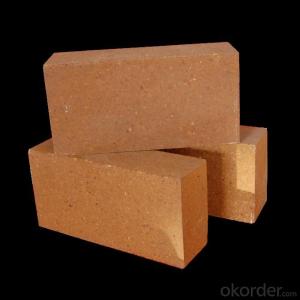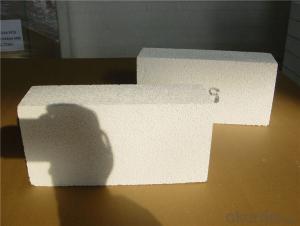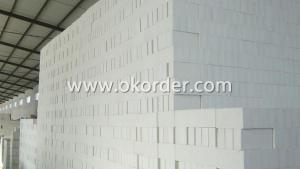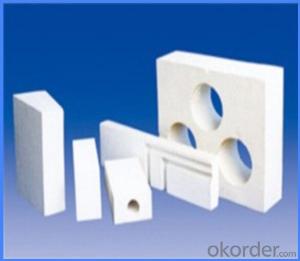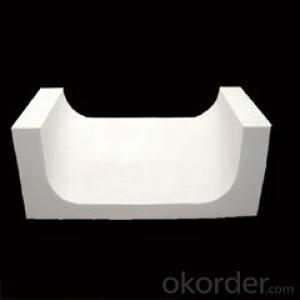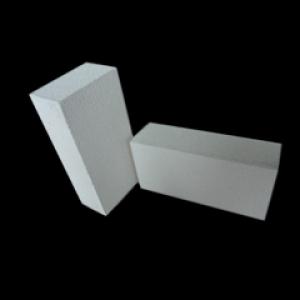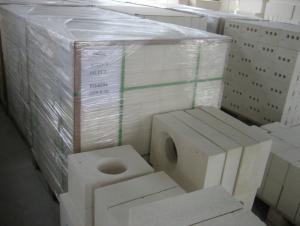INSULATING FIREBRICK Light weight Insulating Firebrick
- Loading Port:
- Qingdao
- Payment Terms:
- TT OR LC
- Min Order Qty:
- 600 pc
- Supply Capability:
- 6000 pc/month
- Option:
- GJM20 GJM23 GJM26 GJM26 GJM26 GJM25
OKorder Service Pledge
OKorder Financial Service
You Might Also Like
Applications:
Kilns for the ceramic, tunnel, shuttle
Forge furnaces
Carbon baking furnaces
Atmosphere furnaces
High temperature kiln lining
Back up insulating of glass melting tanks
Insulating of tin bath area for float glass
Blast furnaces
Chemical and petrochemical industry
Non-ferrous metal industry
Product Description:
As specified by name, Insulating firebricks are of light weight, low thermal conductivity, excellent strength at ambient and elevated temperature. With very low levels of iron and other impurities, the bricks provide good resistance to chemical attach, can be used in tough, reducing atmosphere conditions. Every brick is ground to precise dimensions.
CNBM (China National Building Material) Group is the largest comprehensive building materials group in China that integrates scientific research, manufacturing and logistics into one entity. CNBM is also the largest building materials and equipment specialists in China. Upon the State Council’s approval, CNBM owns more than 300 subordinate manufacturing factories and servicing companies till now. There are 6 fully owned public listed companies and 11 partially owned with substantial shares public listed companies. In many such of these fields, CNBM is playing a
leading role in the building industry in the country. CNBM International Corporation is the most important import
and export platform of CNBM group. With its advantages, CNBM International are mainly concentrate on Cement industries and devotes herself for supplying high quality series of refractories as well as technical consultancies and logistics solution.
CNBM International is highly recognized by its business partners and clients all over the world and has obtained rapid development under the spirit of win-win. Depending on the support of production divisions and its active staff, CNBM international reached a turnover of USD one billion in 2012. We will carry on the mutual beneficial, create value for our employees, share holders and clients and benefit the whole society in our future development.
Thanks you for your interest in our company products and
services. Your valuable comments are most welcome.
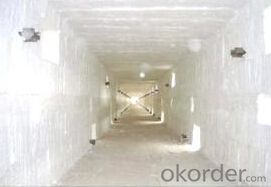
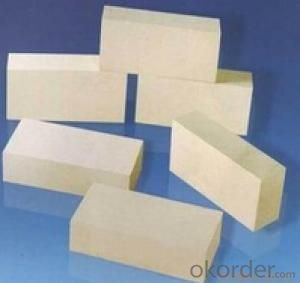
- Q:Do insulating fire bricks require any special curing or firing temperature profiles?
- Yes, insulating fire bricks do require special curing or firing temperature profiles. These bricks are typically made from lightweight refractory materials, which need to be slowly heated and cooled to avoid cracking or damage. The curing process involves gradually increasing the temperature over several hours and holding it at a specific level for a certain period. This allows the bricks to undergo physical and chemical changes, ensuring their optimal performance and durability in high-temperature applications.
- Q:Are insulating fire bricks suitable for insulation in heat treatment furnaces?
- Insulation in heat treatment furnaces can be effectively achieved by using insulating fire bricks. These bricks have been specifically engineered to endure high temperatures while offering exceptional thermal insulation. Their low thermal conductivity aids in reducing heat loss and ensuring a consistent temperature within the furnace. Furthermore, insulating fire bricks are lightweight, facilitating easier handling and installation. Moreover, they exhibit considerable resistance to thermal shock, enabling them to withstand sudden temperature variations without sustaining any cracks or fractures. To sum up, opting for insulating fire bricks proves to be a trustworthy and efficient solution for heat treatment furnace insulation.
- Q:Are insulating fire bricks suitable for use in the construction of drying ovens?
- Yes, insulating fire bricks are suitable for use in the construction of drying ovens. They have excellent thermal insulation properties, which helps to retain heat and prevent heat loss during the drying process. Additionally, insulating fire bricks can withstand high temperatures and have good resistance to thermal shocks, making them a reliable choice for drying oven construction.
- Q:Are insulating fire bricks suitable for insulation in refinery heaters?
- Yes, insulating fire bricks are suitable for insulation in refinery heaters. Refinery heaters operate at extremely high temperatures, and insulating fire bricks are designed to withstand these temperatures and provide effective insulation. These bricks have low thermal conductivity, which means they can prevent heat from escaping the heater, thus reducing energy loss and increasing the overall efficiency of the heater. Additionally, insulating fire bricks have excellent thermal shock resistance, meaning they can withstand rapid temperature changes without cracking or breaking. This is crucial in refinery heaters, as they often experience frequent temperature fluctuations during operation. Furthermore, insulating fire bricks are lightweight and easy to install, making them a convenient choice for insulation in refinery heaters. Overall, insulating fire bricks are a suitable and effective option for insulation in refinery heaters.
- Q:Can insulating fire bricks be used as a refractory material?
- Yes, insulating fire bricks can be used as a refractory material. Insulating fire bricks have excellent thermal insulation properties and can withstand high temperatures, making them suitable for use in various refractory applications such as furnaces, kilns, and insulation linings.
- Q:Can insulating fire bricks be used in refractory lining applications?
- Insulating fire bricks can indeed find utility in various refractory lining applications. Crafted from lightweight materials like clay or silica, these bricks possess exceptional insulating properties. Their main purpose is to offer superior thermal insulation, thereby minimizing heat loss and promoting energy efficiency, particularly in high-temperature settings. Commonly adopted in refractory lining applications, insulating fire bricks serve to line the walls, floors, and roofs of furnaces, boilers, kilns, and similar industrial equipment. Their effectiveness lies in their ability to impede heat transfer to the surrounding environment while maintaining the desired internal temperature. In addition, insulating fire bricks exhibit remarkable resistance to thermal shock. This means they can tolerate rapid temperature fluctuations without cracking or failing. Consequently, they prove suitable for applications involving frequent heating and cooling cycles. Moreover, these bricks boast low thermal conductivity. This quality allows them to effectively restrict heat transfer between distinct areas of the refractory lining. Consequently, they play a crucial role in preventing hotspots and temperature imbalances, thereby ensuring the uniform distribution of heat throughout the equipment. Taken as a whole, insulating fire bricks represent a versatile and efficient choice for refractory lining applications. They excel in providing exceptional thermal insulation, resilience against thermal shock, and uniform heat distribution.
- Q:Are insulating fire bricks resistant to carbon monoxide attack?
- Insulating fire bricks have a general resistance to carbon monoxide attack. They are made from materials that can withstand high temperatures and chemical corrosion, including carbon monoxide. These bricks are commonly used in environments where high temperatures and exposure to gases like carbon monoxide are frequent, such as furnaces, kilns, and fireplaces. The composition of the bricks allows them to endure long periods of exposure to carbon monoxide without deteriorating or reacting with the gas. However, it is important to remember that continuous exposure to extremely high levels of carbon monoxide can eventually harm any material, including insulating fire bricks. Therefore, it is still crucial to ensure proper ventilation and safety precautions when dealing with carbon monoxide in any situation.
- Q:Can insulating fire bricks be used for insulation in power boiler walls?
- Yes, insulating fire bricks can be used for insulation in power boiler walls. Insulating fire bricks are specifically designed to have low thermal conductivity, allowing them to effectively insulate high temperature environments such as power boilers. They are made from lightweight materials such as clay and other refractory materials, which provide excellent insulation properties while withstanding the extreme heat conditions found in power boilers. The use of insulating fire bricks in power boiler walls helps to reduce heat loss, improve energy efficiency, and maintain high operating temperatures within the boiler.
- Q:Are insulating fire bricks resistant to acids and alkalis?
- Insulating fire bricks are generally resistant to acids and alkalis, but the level of resistance can vary depending on the specific composition and manufacturing process of the bricks. Insulating fire bricks are typically made from materials such as alumina, silica, or a combination of both, which provide excellent resistance to high temperatures and thermal conductivity. These materials are generally chemically inert, meaning they do not react with acids or alkalis. However, it is important to note that some acids and alkalis can still cause slight degradation or corrosion over time, especially if they are highly concentrated or used at elevated temperatures. In such cases, it is advisable to consult the manufacturer's specifications or conduct specific tests to determine the level of resistance of the insulating fire bricks to the particular acids or alkalis in question. Overall, insulating fire bricks are a suitable choice for applications that involve exposure to acids and alkalis, but it is always recommended to consider the specific requirements and consult with experts or manufacturers to ensure the bricks will perform adequately in the intended environment.
- Q:Can insulating fire bricks be used in the construction of refractory coatings?
- Yes, insulating fire bricks can be used in the construction of refractory coatings. Insulating fire bricks are designed to have low thermal conductivity, which means they are excellent at preventing heat transfer. This makes them ideal for use in refractory coatings, which are used to protect structures from high temperatures. Refractory coatings are applied to surfaces that are exposed to extreme heat, such as furnaces, kilns, and chimneys. These coatings provide a layer of insulation that helps to retain heat, prevent damage to the underlying structure, and improve energy efficiency. Insulating fire bricks can be used as a base layer in the construction of refractory coatings. They can be stacked and bonded together to form a solid and heat-resistant surface. This layer acts as a barrier to prevent heat from transferring through to the underlying structure. In addition to their low thermal conductivity, insulating fire bricks also have other properties that make them suitable for use in refractory coatings. They have high temperature resistance, meaning they can withstand the extreme heat generated in industrial applications. They are also lightweight and easy to handle, making them convenient to install and work with. Overall, insulating fire bricks are a reliable option for constructing refractory coatings. They provide excellent insulation and protection against high temperatures, making them a valuable component in the construction of heat-resistant structures.
1. Manufacturer Overview |
|
|---|---|
| Location | |
| Year Established | |
| Annual Output Value | |
| Main Markets | |
| Company Certifications | |
2. Manufacturer Certificates |
|
|---|---|
| a) Certification Name | |
| Range | |
| Reference | |
| Validity Period | |
3. Manufacturer Capability |
|
|---|---|
| a)Trade Capacity | |
| Nearest Port | |
| Export Percentage | |
| No.of Employees in Trade Department | |
| Language Spoken: | |
| b)Factory Information | |
| Factory Size: | |
| No. of Production Lines | |
| Contract Manufacturing | |
| Product Price Range | |
Send your message to us
INSULATING FIREBRICK Light weight Insulating Firebrick
- Loading Port:
- Qingdao
- Payment Terms:
- TT OR LC
- Min Order Qty:
- 600 pc
- Supply Capability:
- 6000 pc/month
- Option:
- GJM20 GJM23 GJM26 GJM26 GJM26 GJM25
OKorder Service Pledge
OKorder Financial Service
Similar products
New products
Hot products
Related keywords
